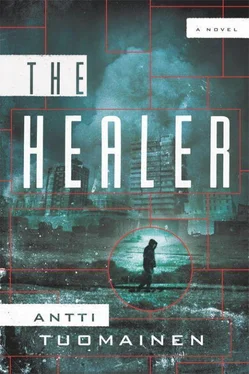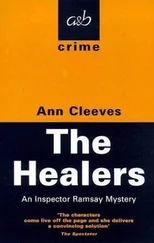“Are you there, Elina?” I asked to make sure.
“Pasi Tarkiainen?” she asked, startled somehow, sounding like she just realized she was still on the telephone.
“Johanna’s old boyfriend.”
“Yeahhh.”
Tense, waiting. That’s how she sounded. I asked her in the most patient voice possible: “‘Yeahhh,’ meaning that you know him, or ‘yeahhh,’ meaning that you’re waiting for me to ask something else?”
“Yeahhh, I remember Pasi Tarkiainen. Although it was a long time ago. You don’t need to worry about it.”
The last two sentences came so quickly that at first I didn’t understand what she meant.
“No, no, no,” I said, when I understood. “That’s not why I asked about him.”
“Then why?” she asked, surprisingly interested now, positively keen to know.
“I’m not sure yet. Do you remember when Johanna and this Pasi Tarkiainen moved to Kivinokka?”
“Vaguely.”
Why was she speaking so quickly now?
“Do you remember anything in particular about that time? Did something happen between them?”
“That’s a kind of strange question.”
Again the words came quickly, strung together. I sighed.
“I know it is. But do you remember anything?”
“Well, nothing in particular comes to mind. It was a long time ago. Everything was… different then.”
“Yes, it was,” I said, speaking in a consciously slow, clear voice, trying to put the brakes on the speed of her speech. “But Johanna lived there for about a year and a half. Then she moved away.”
“This is kind of a weird conversation. Does Pasi have anything to do with your not hearing from Johanna?”
Pasi. I couldn’t bring myself to refer to him by his first name. He was Pasi Tarkiainen to me.
“I don’t know yet. Elina, try to remember. Was there anything unusual happening, when she moved away from Kivinokka, for instance?”
“I—” she began.
In the background, I could hear a cough coming from deep in the lungs, then two thuds on the wooden floor and an irritated mumble.
“Ahti’s awake,” Elina said. She sounded positively overjoyed. “Tapani, is it all right if I try to remember and call you later?”
She hung up.
I stood looking at the enlarged image on the computer screen—the lilliputian yellow house bathed in soft spring sunlight, the lush green lawn of the yard, and a man working in the background, his back to the camera, a shovel or rake in his large hands, his shoulders broad, his hair in a ponytail.
“You could have just called.”
Harri Jaatinen walked around his desk, sat behind it, and looked at me in an uncomfortably fatherly way.
“I was going to call,” I said and sat down firmly in a chair. “But I needed to show you some photos and explain some connections between things.”
I was aware that I sounded like any number of conspiracy theorists. I held up a hand, although Jaatinen hadn’t said anything.
“I’m sure this sounds peculiar. But I did what you suggested: I started with Pasi Tarkiainen.” I paused for a second, then two. “And I found my wife. Thirteen years ago.”
I explained what had happened, showed Jaatinen the photos, and put several papers in front of him on the desk. He glanced at me before he began to read. There was weariness in his eyes.
The room hummed with the sound of Jaatinen’s laptop and the air-conditioning vent in the center of the ceiling. The laptop whirred at a high pitch. Jaatinen read for about five minutes, looked up from the papers, glanced at me—perhaps not as wearily now—looked at the pictures again, and typed something into his computer. Then he leaned back in his chair.
“Good work,” he said.
I looked at him in bewilderment.
“That’s all?” I said. “Good work?”
“Good work,” he said, as if I hadn’t understood him. “That’s a lot.”
“Aren’t we going to act? Do something?”
He made a gesture with his left hand that said “Be my guest.”
“OK,” I said. “What do you think about all this?”
“About all what?”
“About what I’ve found out.”
His voice was as dry and colorless as ever: “What exactly have you found out?”
I raised my eyebrows, sincerely surprised. Hadn’t I just explained it to him?
“Pasi Tarkiainen and my wife once lived together. And that bartender was apparently their neighbor from way back. And Gromov, the photographer Johanna was working with, is dead. And all those things must be somehow connected.”
“Right,” Jaatinen said.
“You agree,” I said, leaning forward.
Jaatinen shook his head.
“Only that it all must be somehow connected.”
I sighed.
“Can you find out what happened to Gromov?”
Jaatinen glanced at his computer.
“It hasn’t been reported yet.”
“Are you sure?”
He looked at the computer again, jabbed a finger at the keyboard a couple of times, and looked at me. Then he spoke, slowly and patiently: “According to this, no one with that name has come in.”
“How is that possible?” I asked. “If his employer already knows about it?”
Jaatinen looked at the computer again.
“Anything’s possible these days. It could just be that they’re busy and won’t make a record of it for another week, or another month. But even that wouldn’t guarantee anything. Even if the body had come in yesterday and a record was made of it immediately, we might not get any autopsy results until summer. That sort of thing can happen.”
I looked at him.
“That wouldn’t be much help to Johanna,” I said, trying not to seem sarcastic. By the sound of it, I failed.
Jaatinen leaned as far back as possible without putting undue strain on himself or the chair.
“I don’t know that it would help her any more if Gromov was on the admission records and the autopsy was under way,” he said. “Or if it’s any use discussing it. As I said, Johanna Lehtinen did a great service to us—to me—on that case, and that’s why I’ve spent time on you and on this… this…” he searched for a word for a moment, but couldn’t find a suitable one, and half-spoke and half-swallowed the word he did find: “investigation.”
I decided to count to ten. I got to six.
“I don’t mean to be a prick,” I said. “I understand that you’re short of staff, flooded with cases, who knows what else. But if Johanna helped you once, now you can help her.”
Jaatinen seemed to consider the matter. He looked straight ahead, anyway, and from the look on his face seemed pensive, or just dead tired.
“It’s difficult to imagine what I can do,” he finally said, “without any detectives.”
I looked at him and didn’t say anything. He guessed what I was thinking and shook his head.
“Why not?” I said.
He thought for a moment.
“Because.”
“Because why?” I said.
“It’s a bad situation. Hopeless, in fact. But it’s still vaguely under control. If we start using pretend police then that’s an admission of defeat on our part.”
“I’m not planning to pretend to be the police. At least not outwardly,” I said.
Jaatinen looked at me and said without blinking an eye, “OK, suggest something.”
* * *
I WENT THROUGH THE location signatures on Johanna’s phone records that Jaatinen had ordered from the telephone company. I had been right about Jätkäsaari. But it hadn’t been the last place Johanna’s phone had been turned on.
An hour and forty-five minutes after I’d spoken with her, Johanna’s phone had been near a cell phone relay station in the Kamppi area—on the corner of Fredrikinkatu and Urho Kekkosen katu, to be more precise. That was at 10:53 p.m.
Читать дальше












